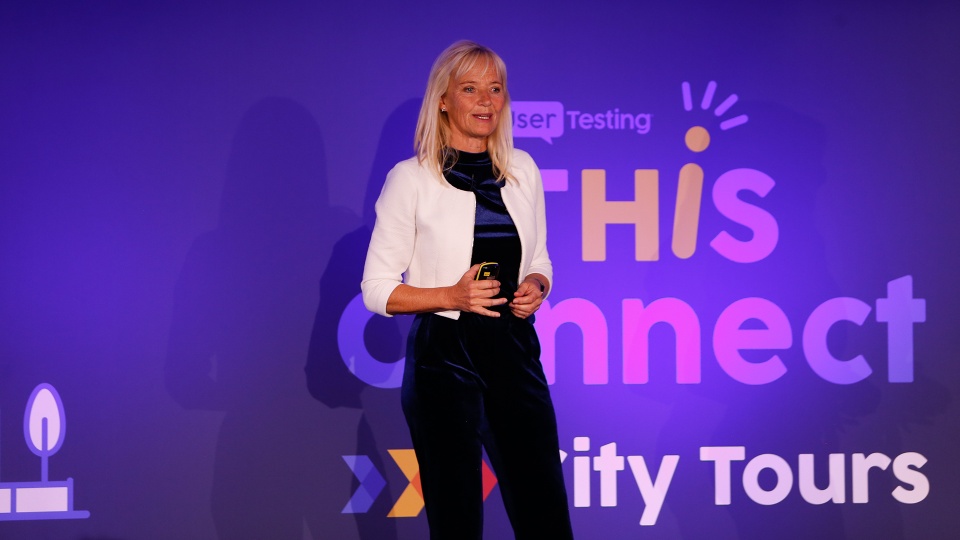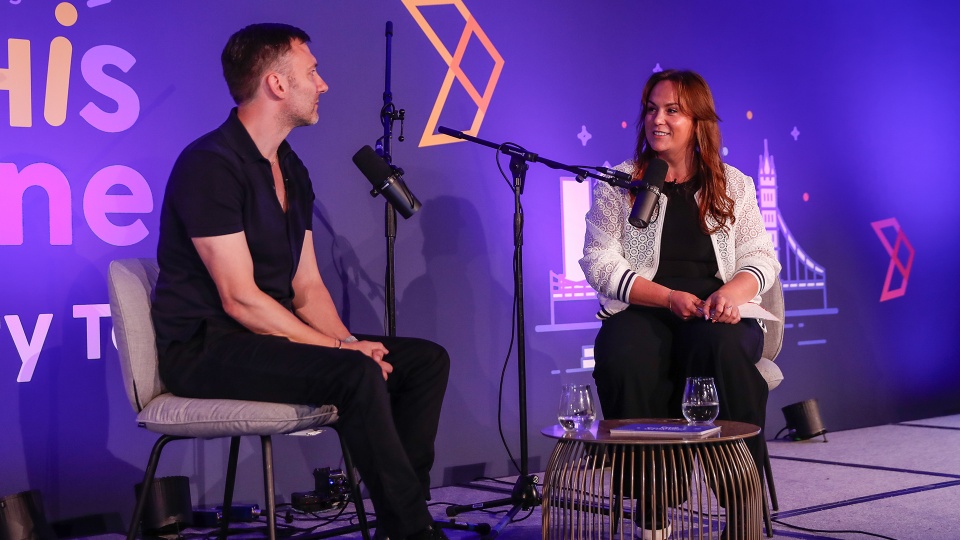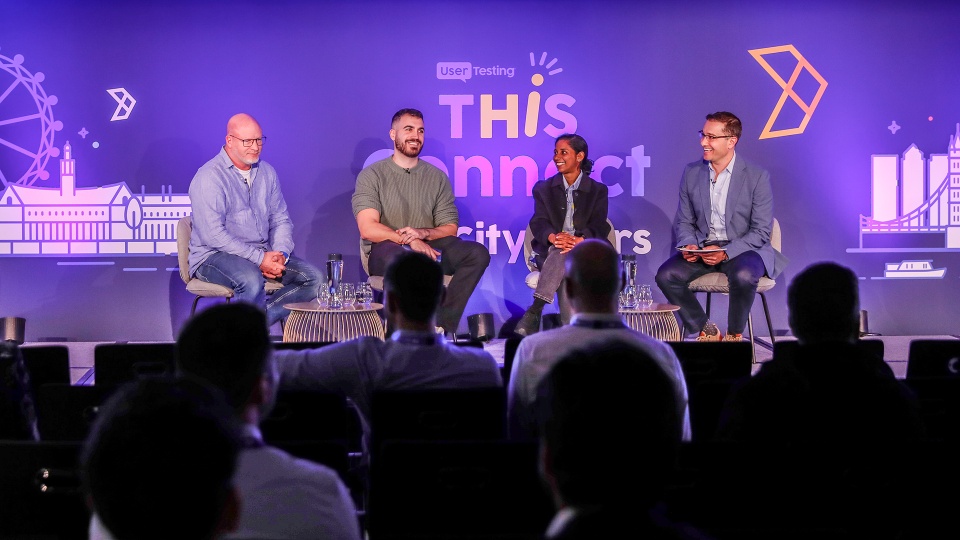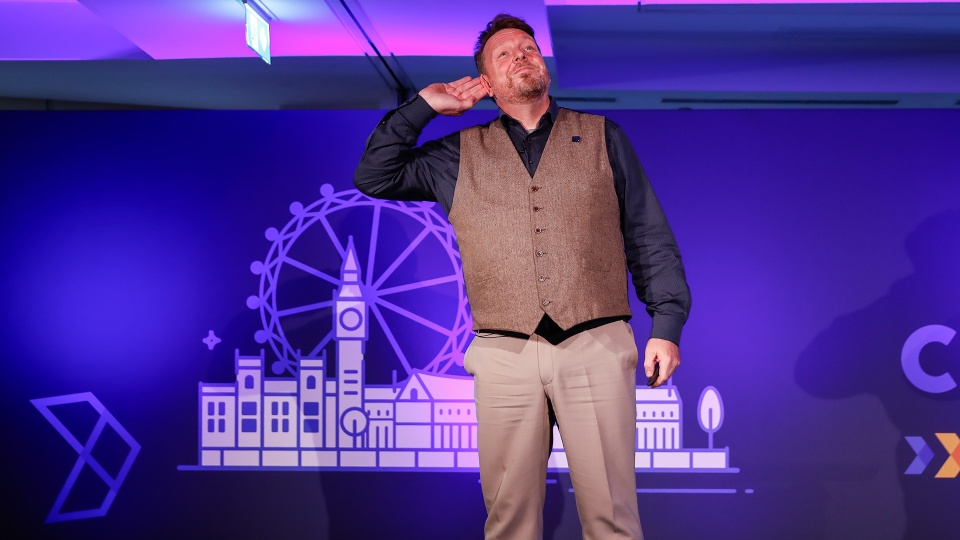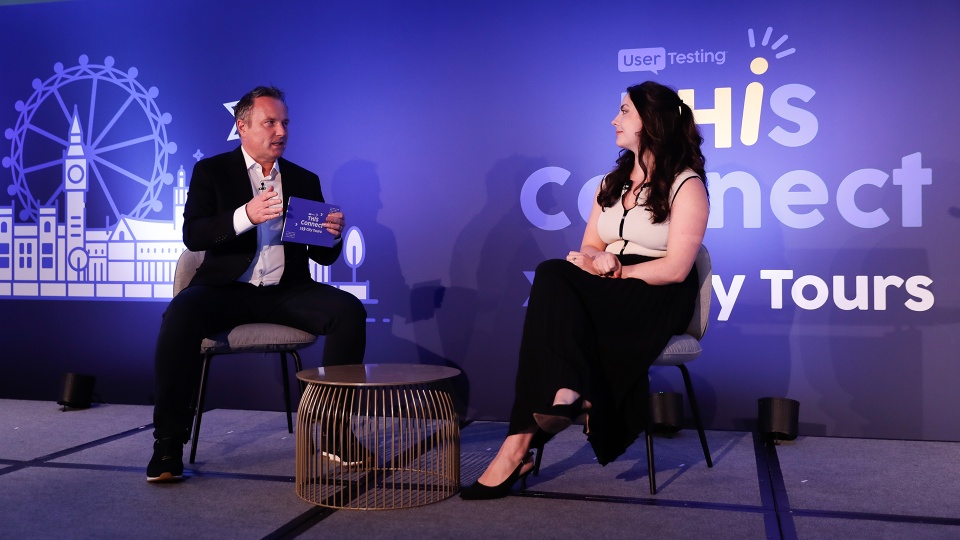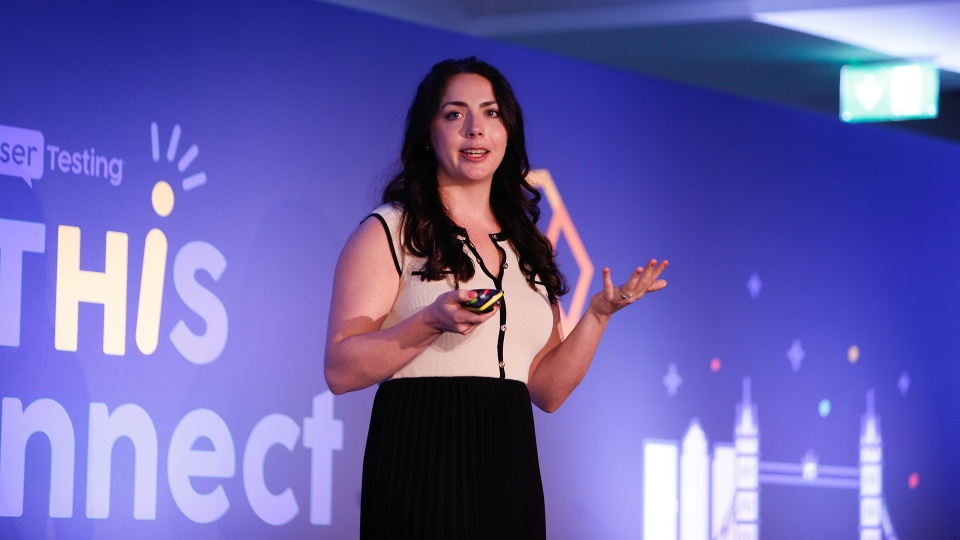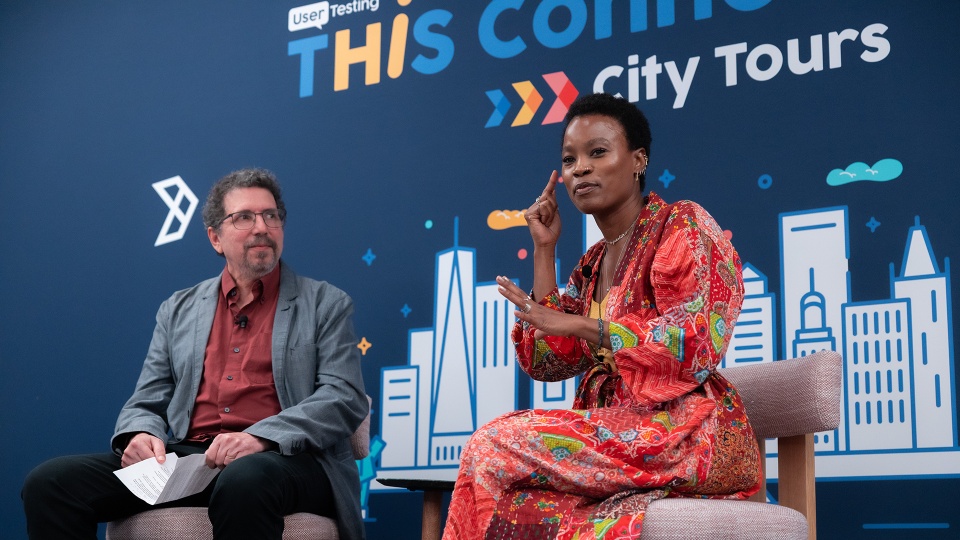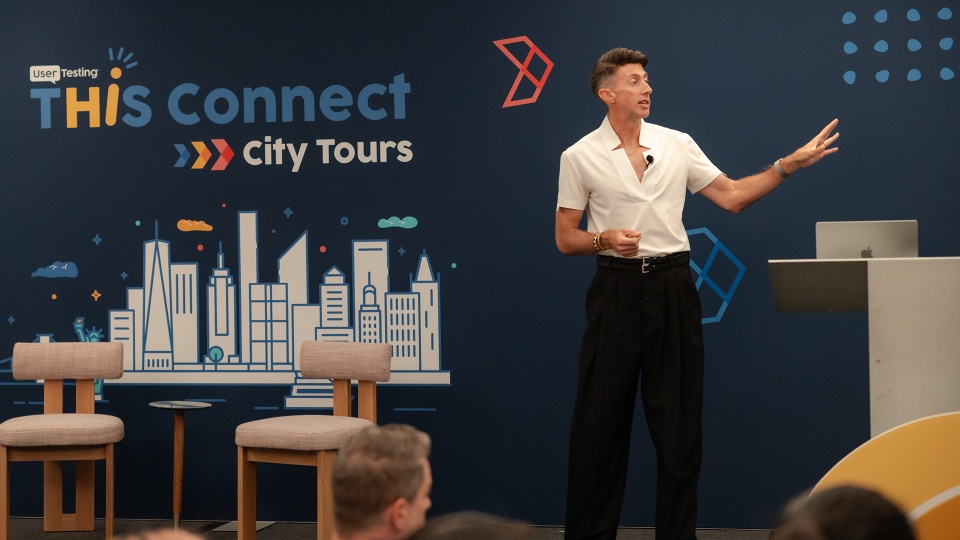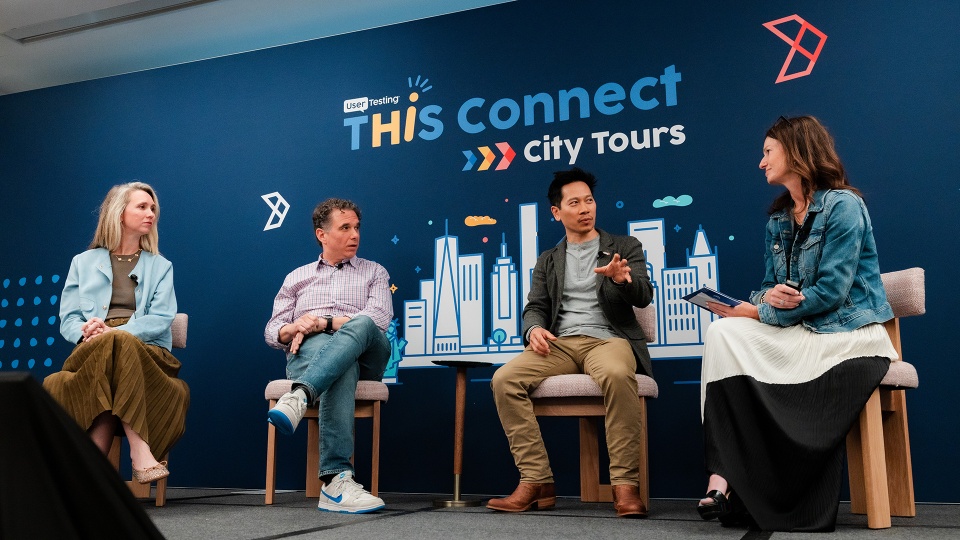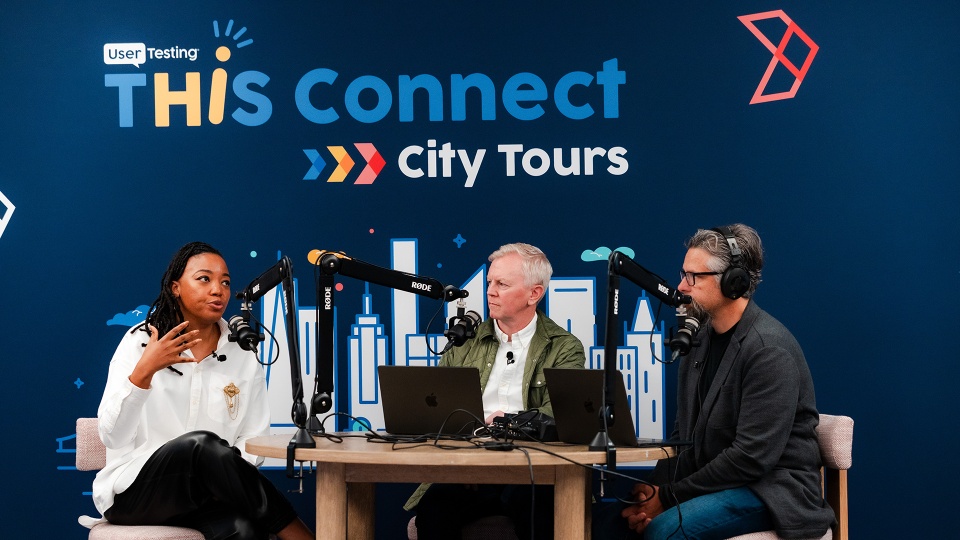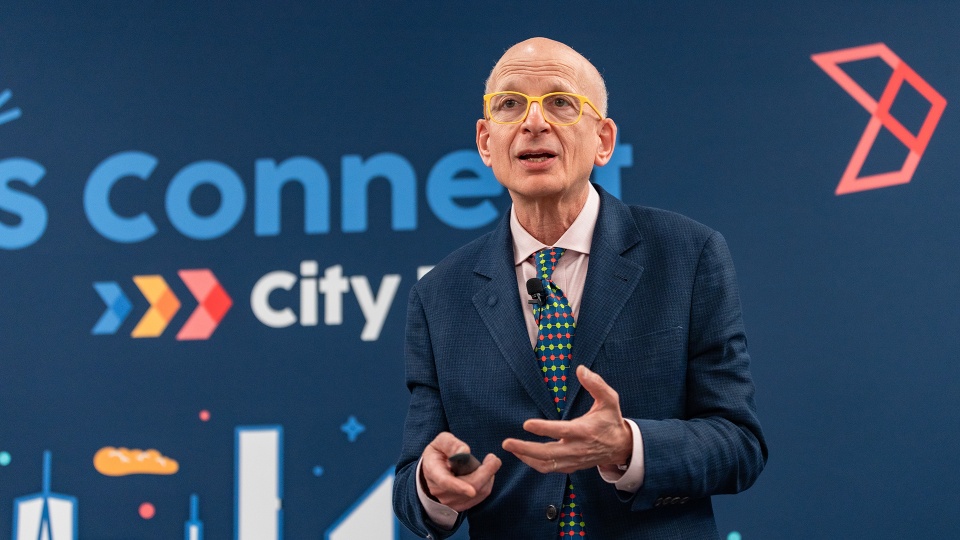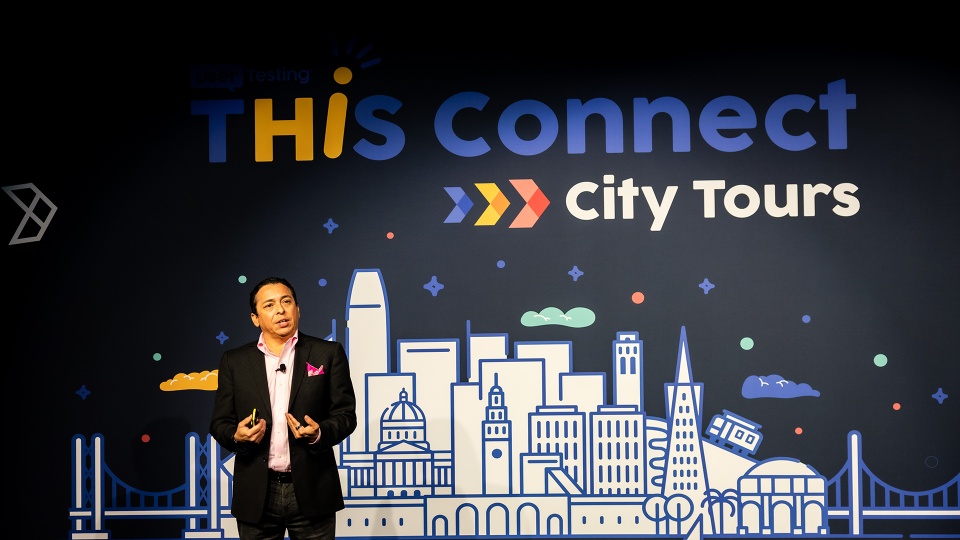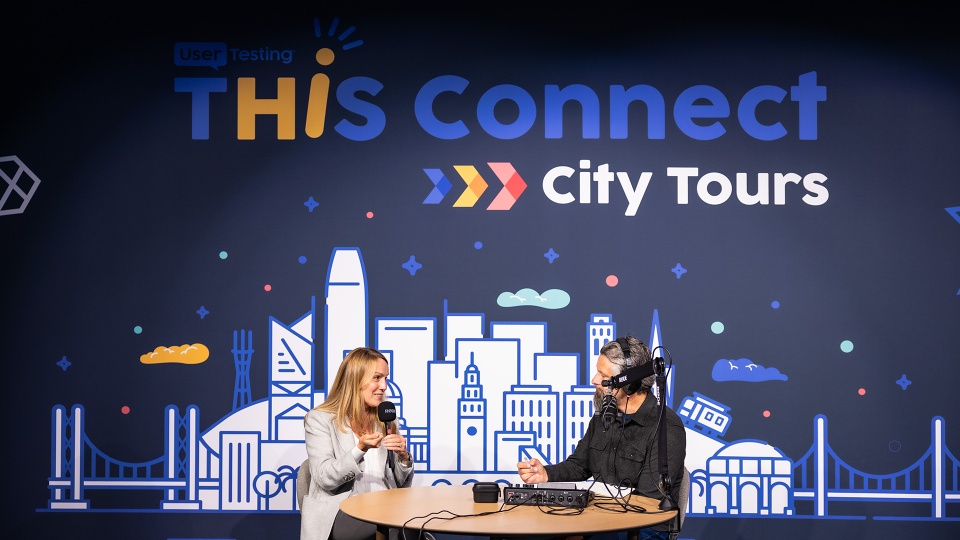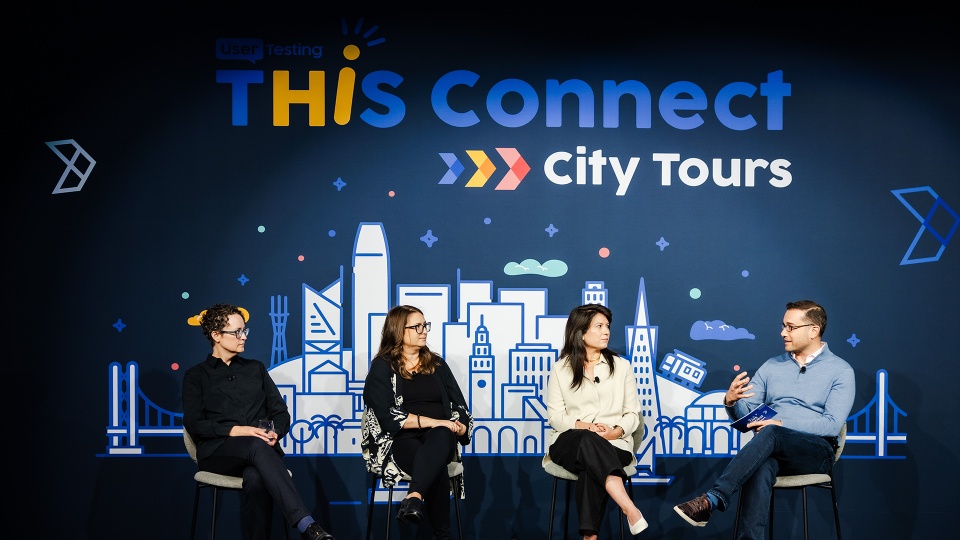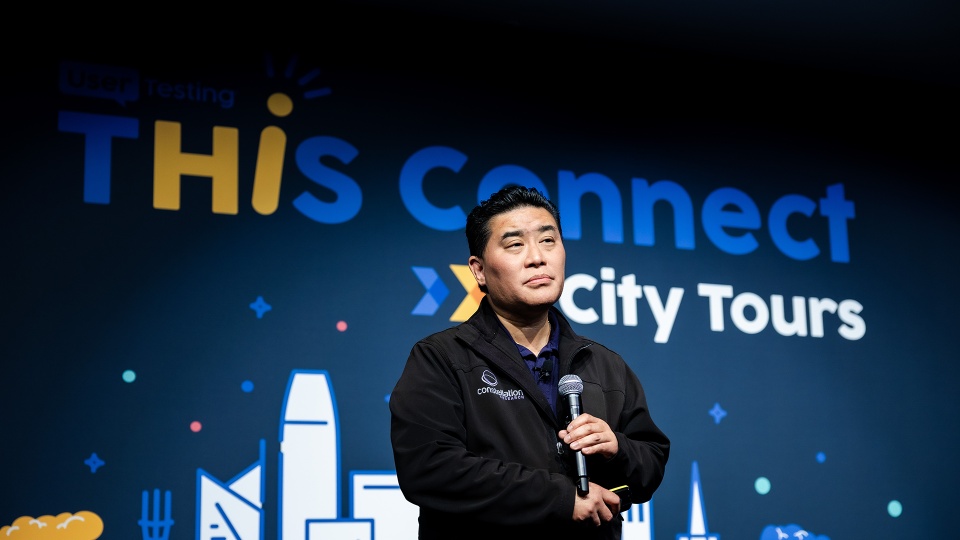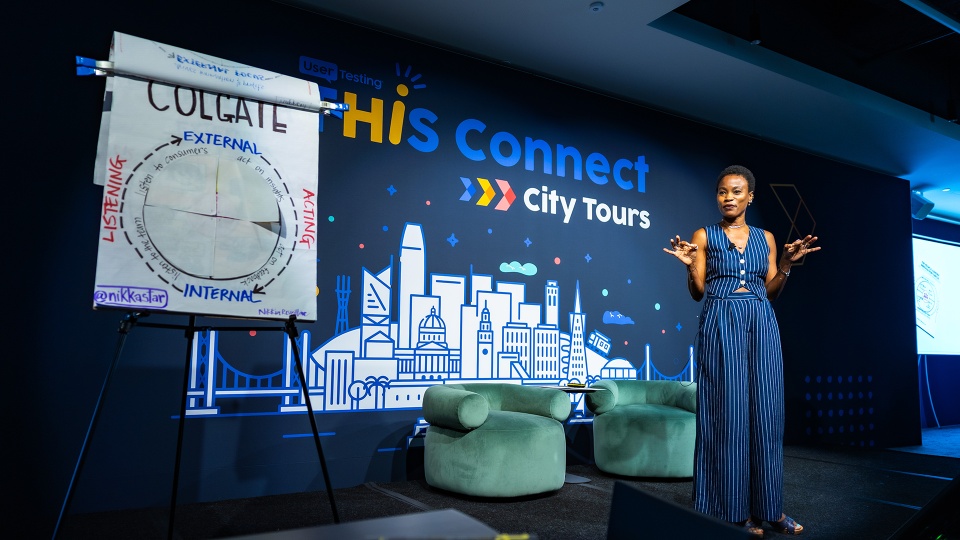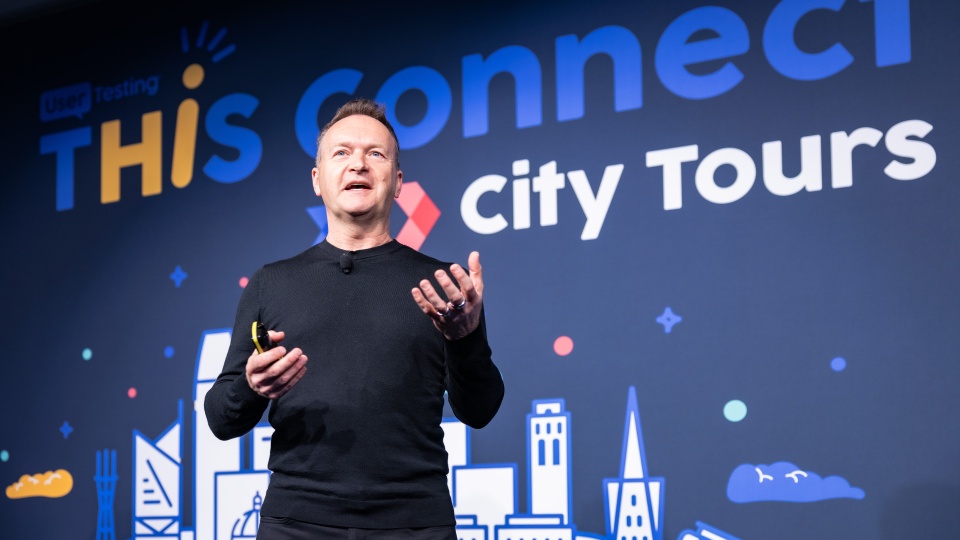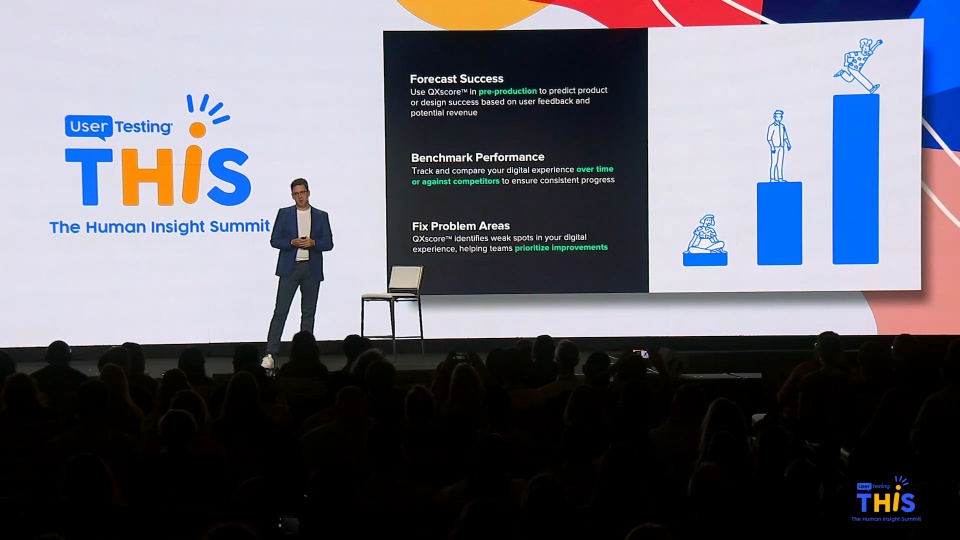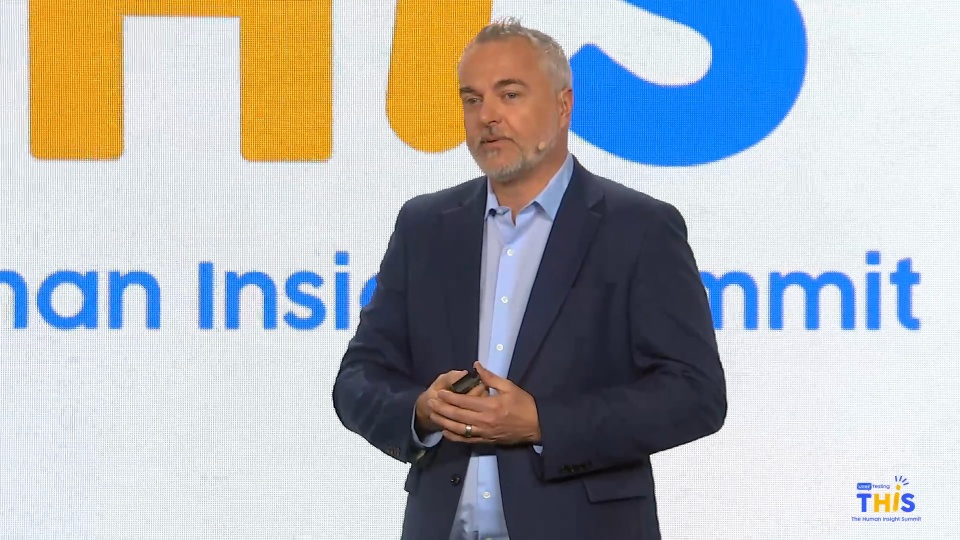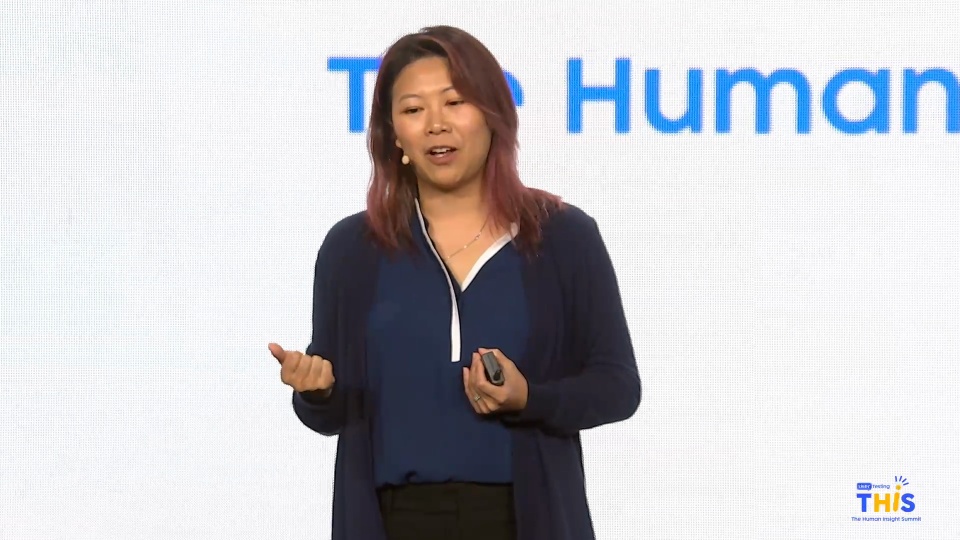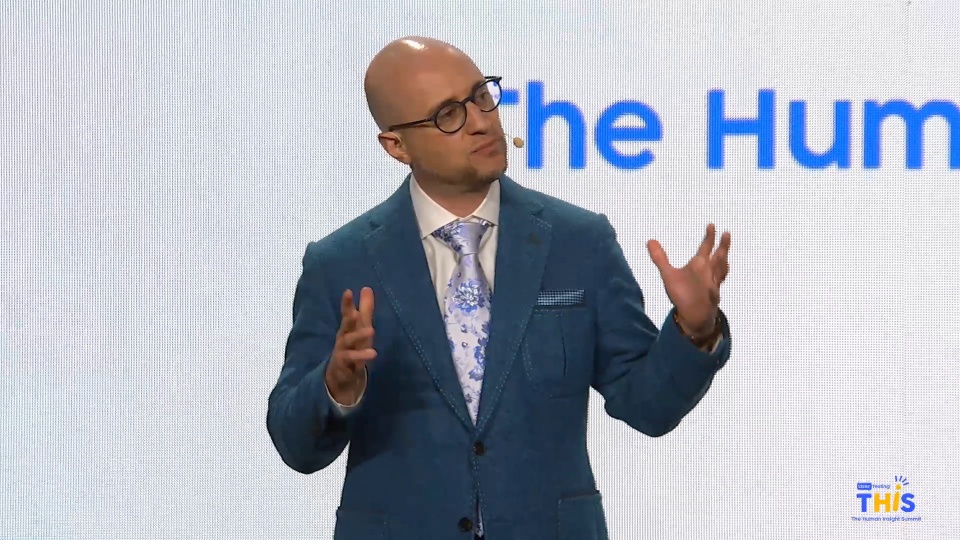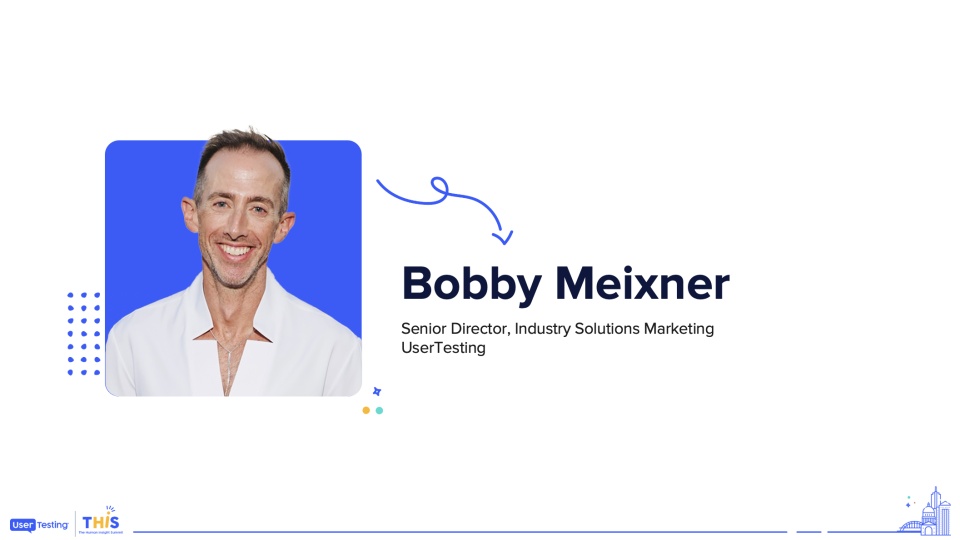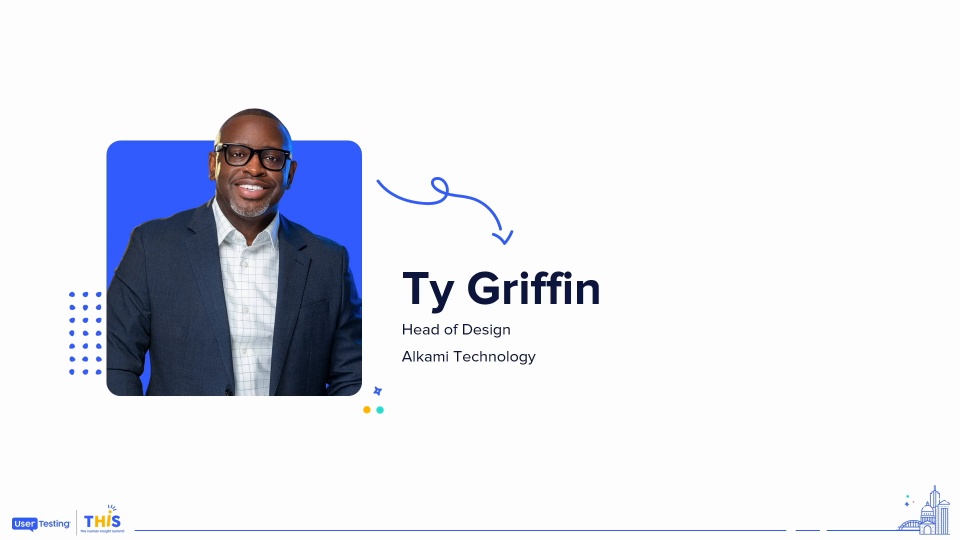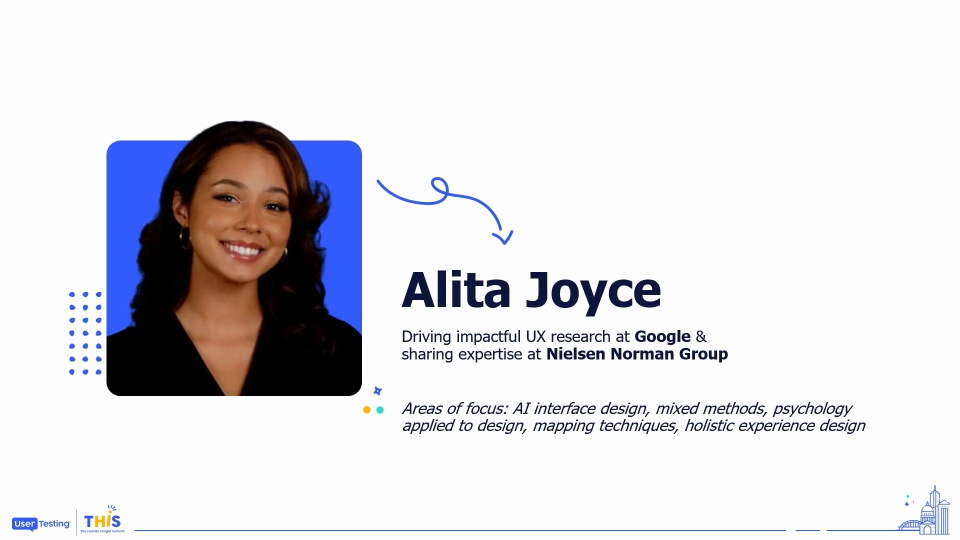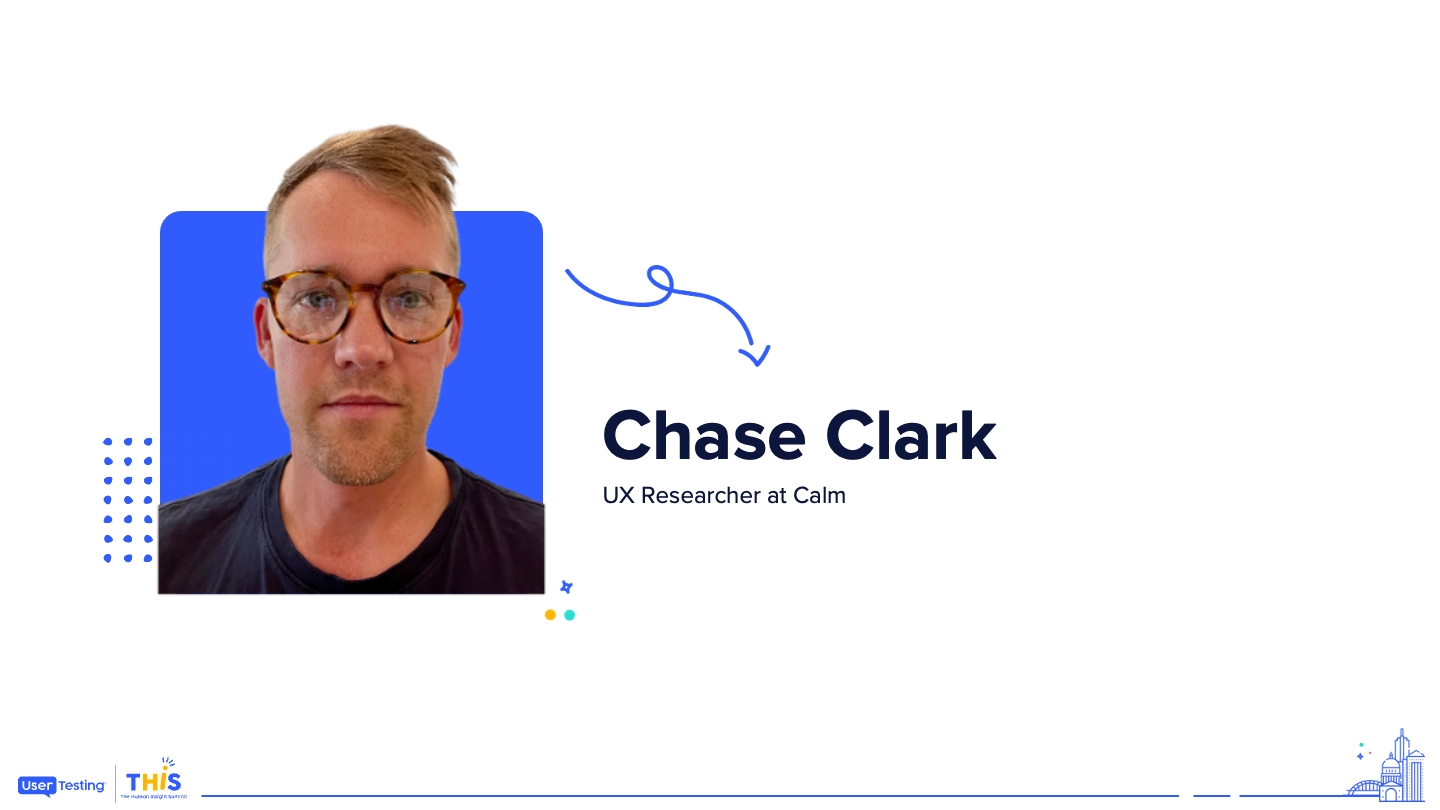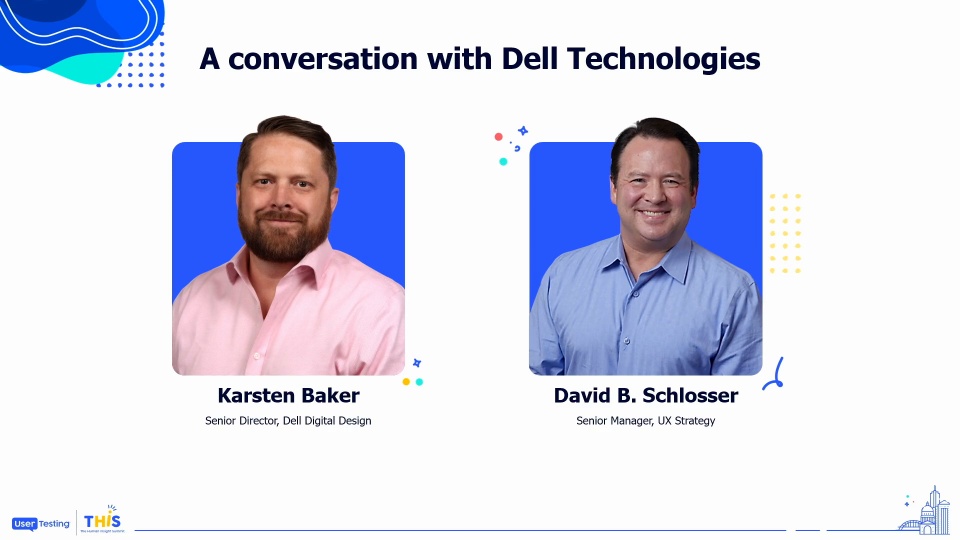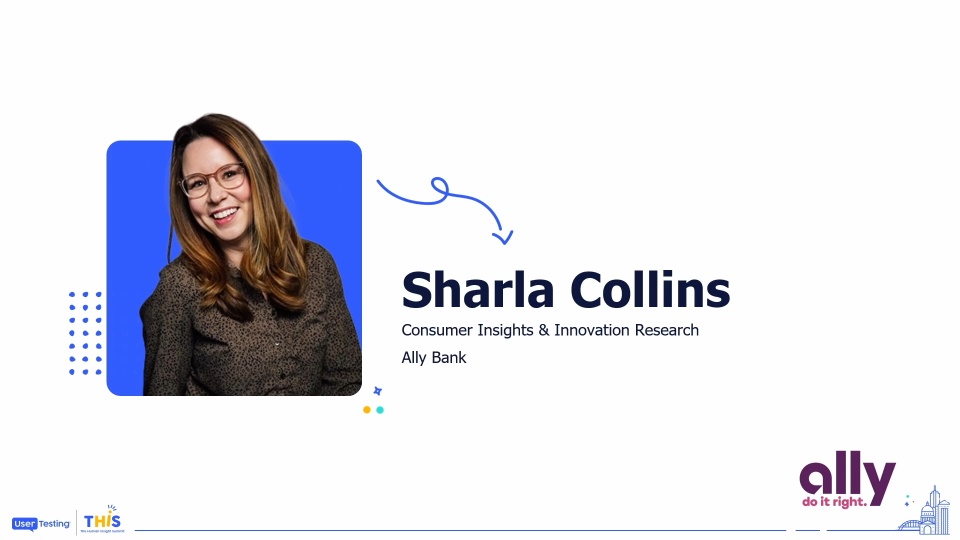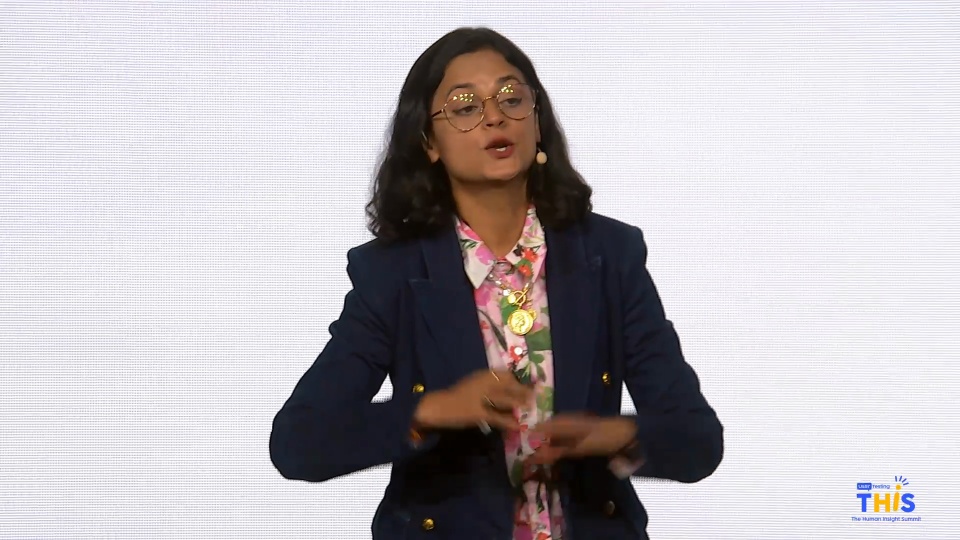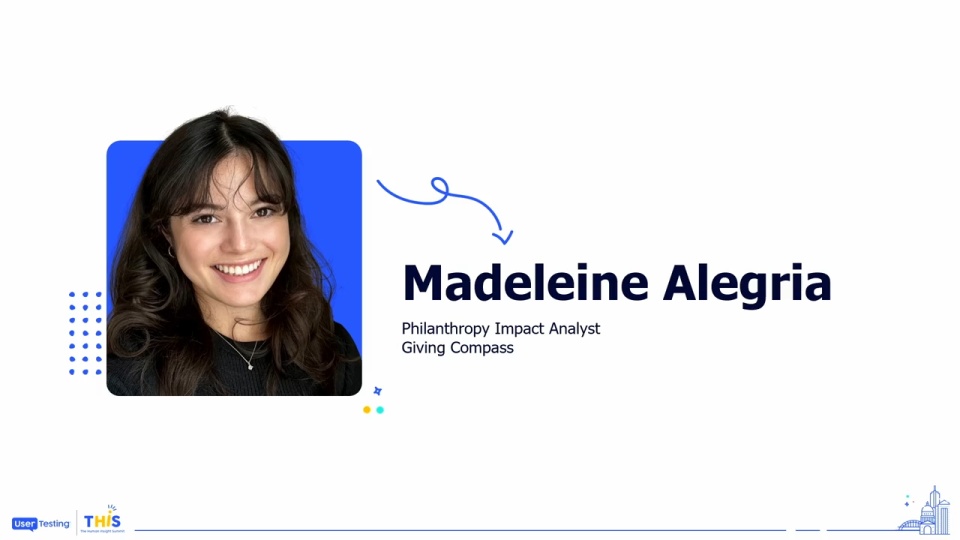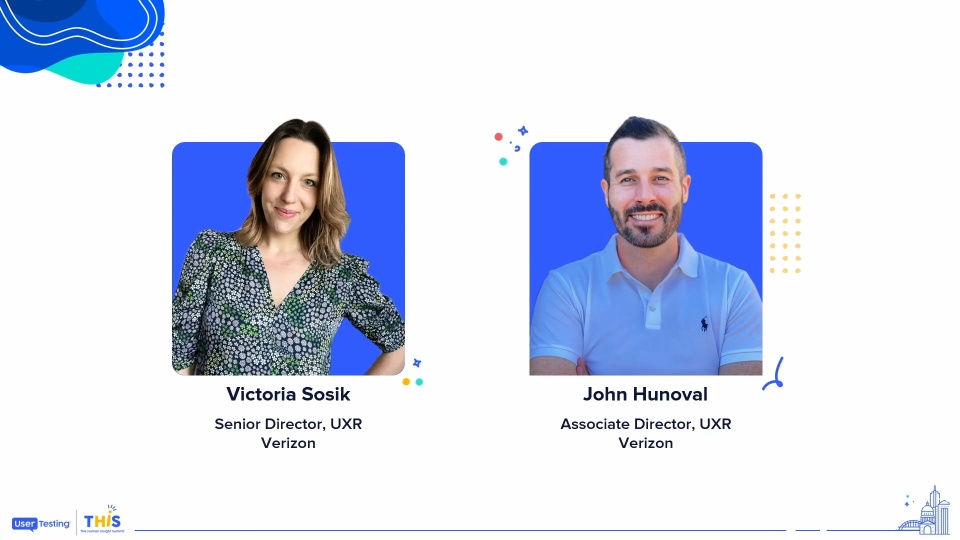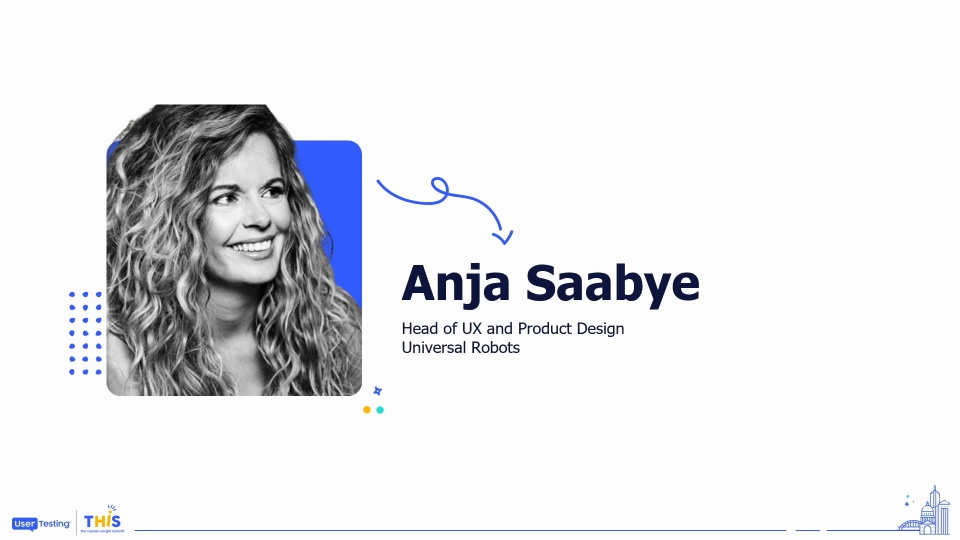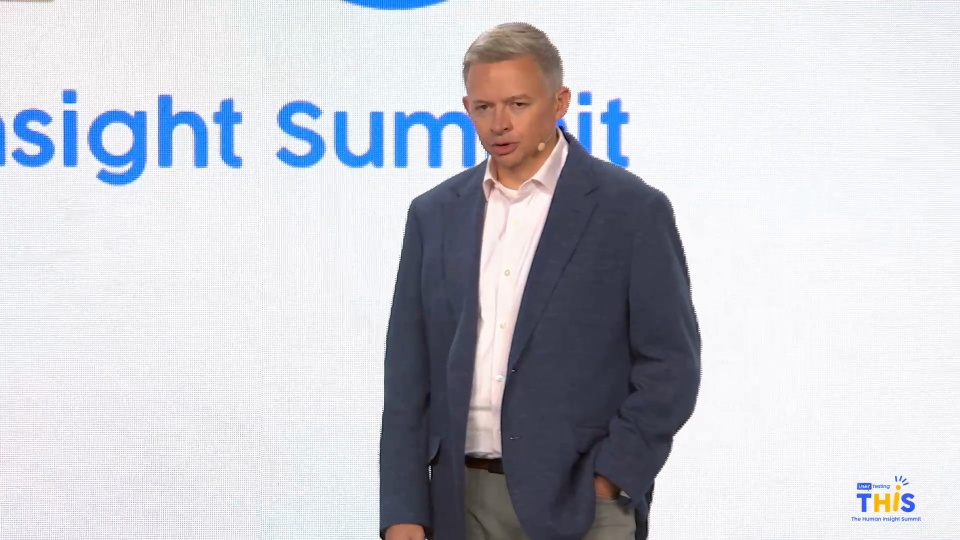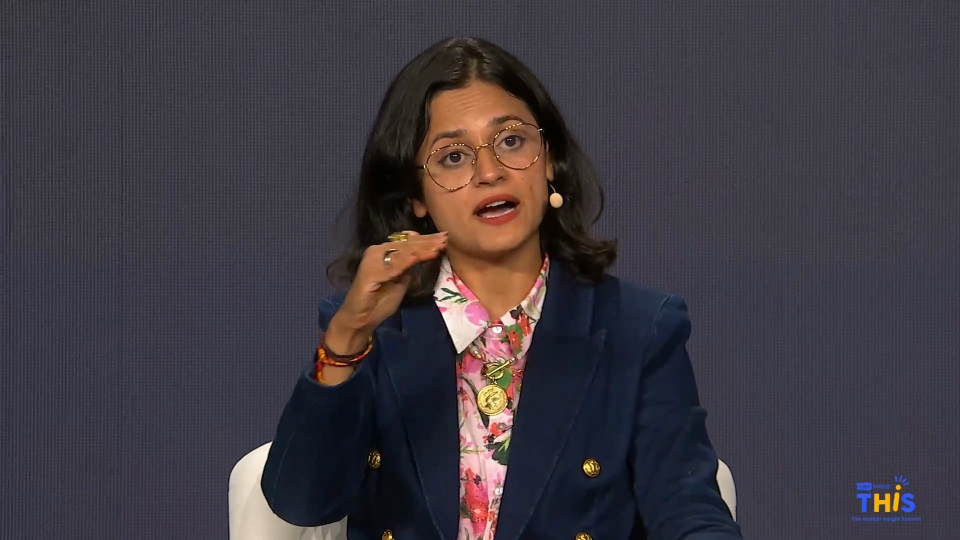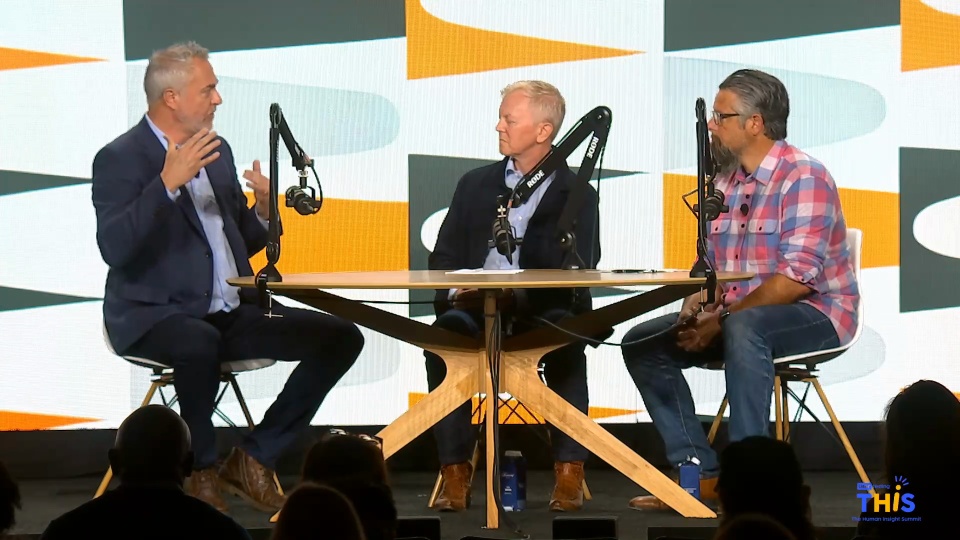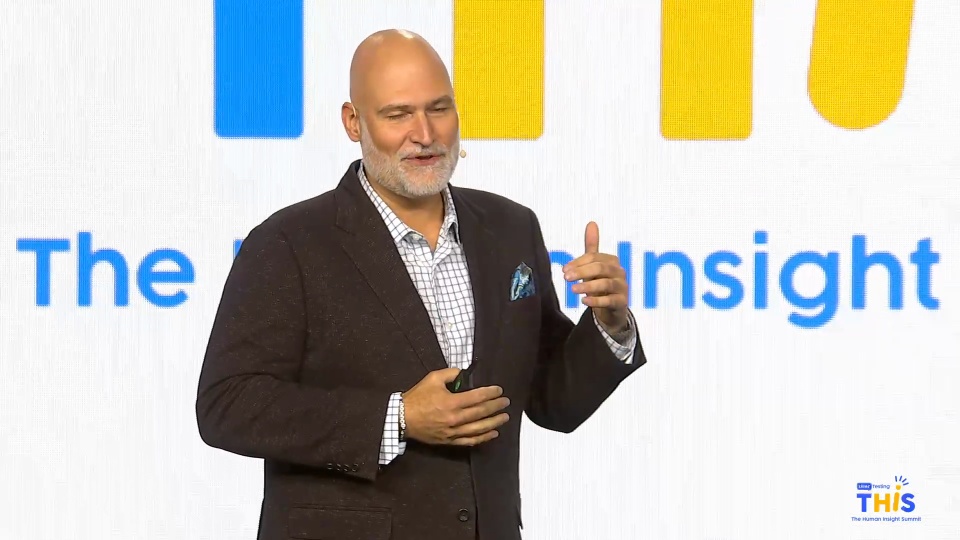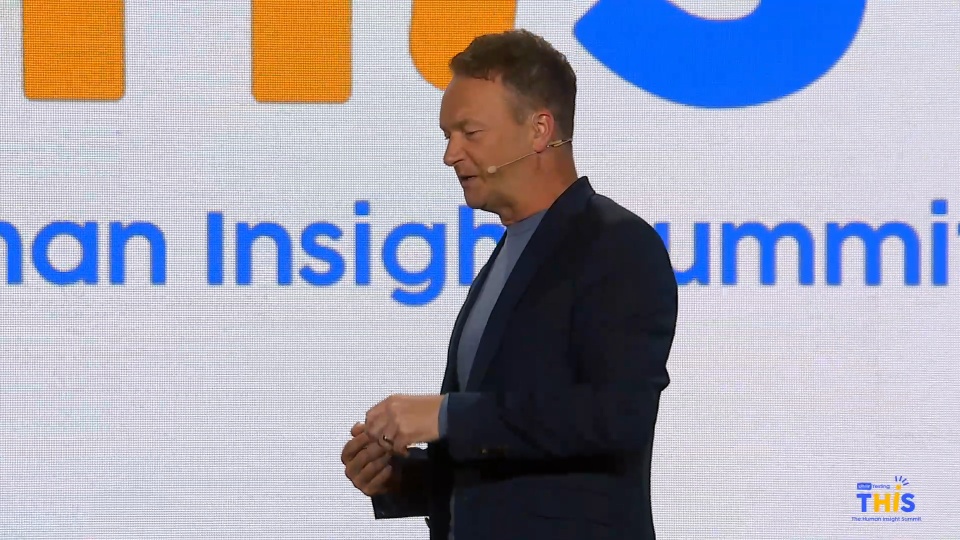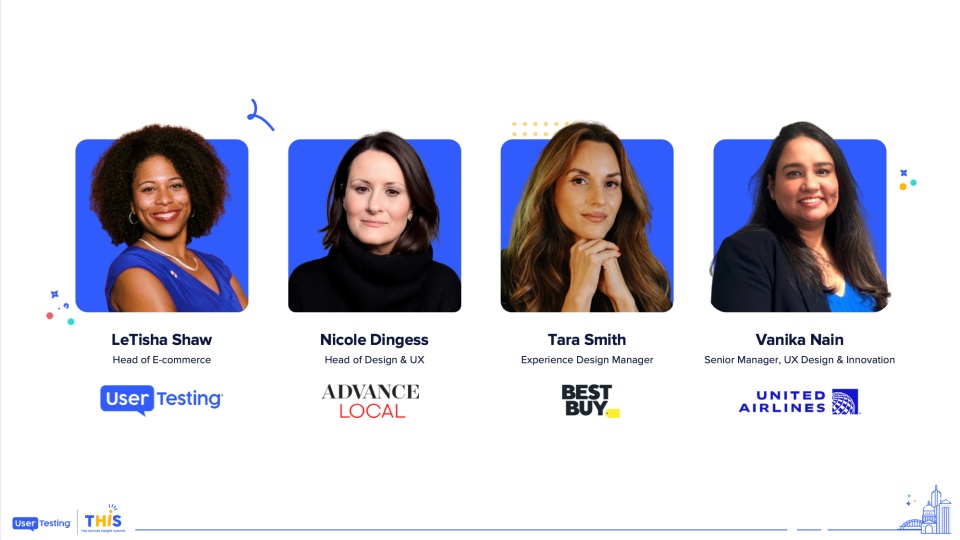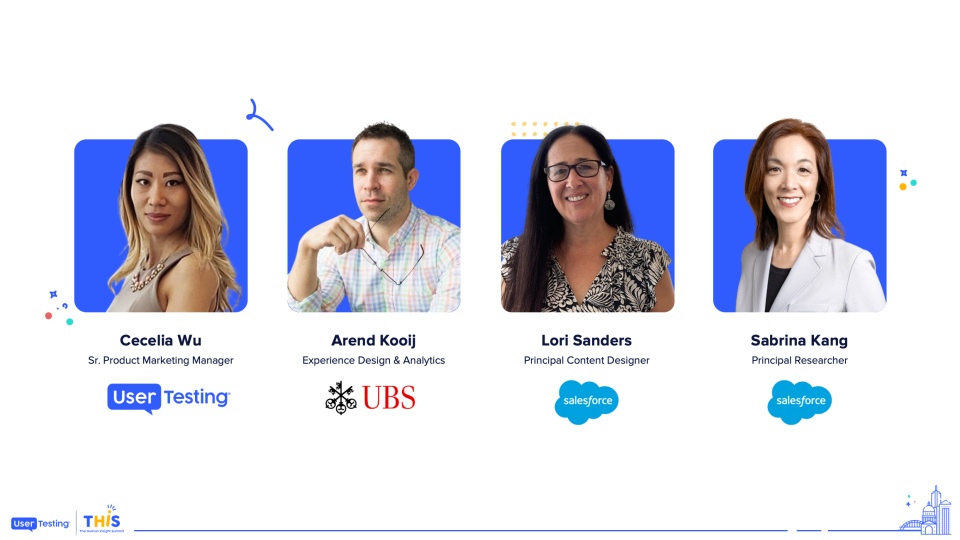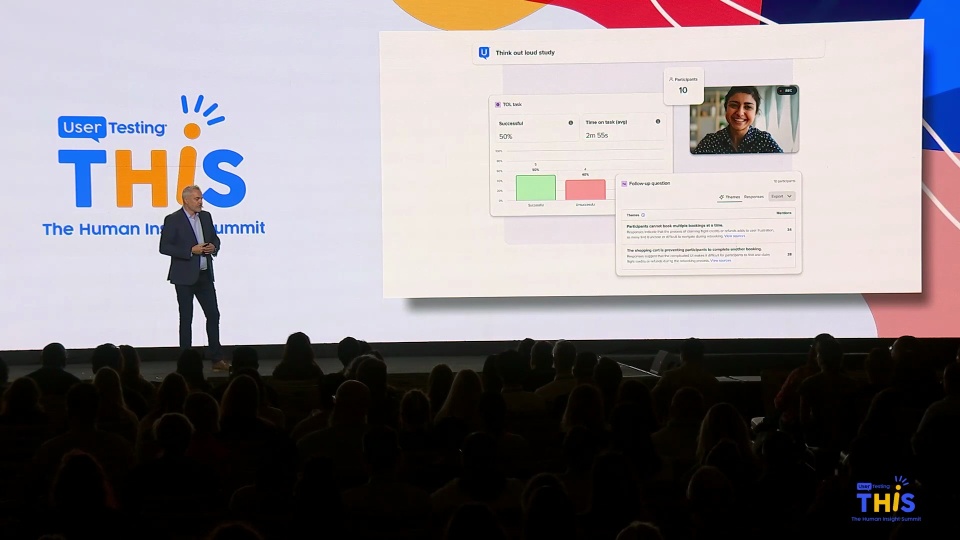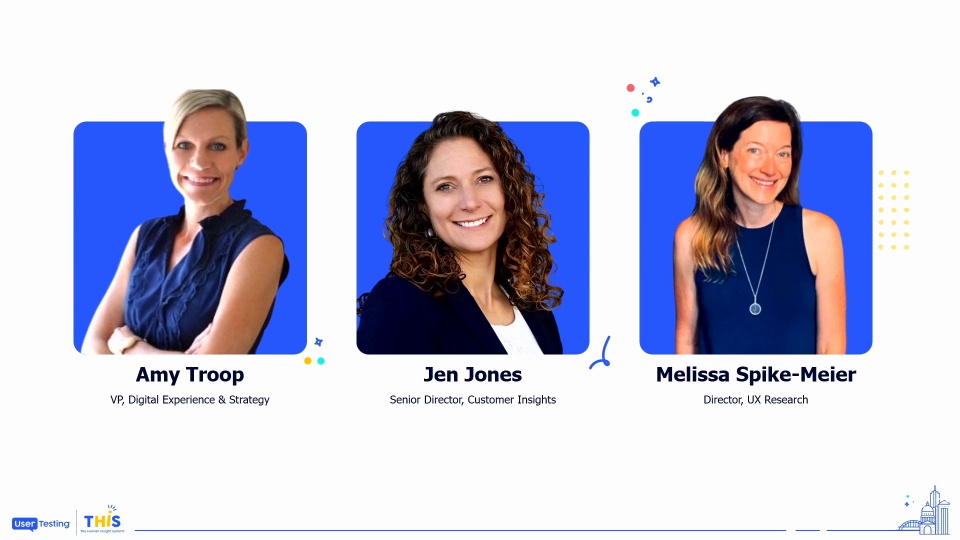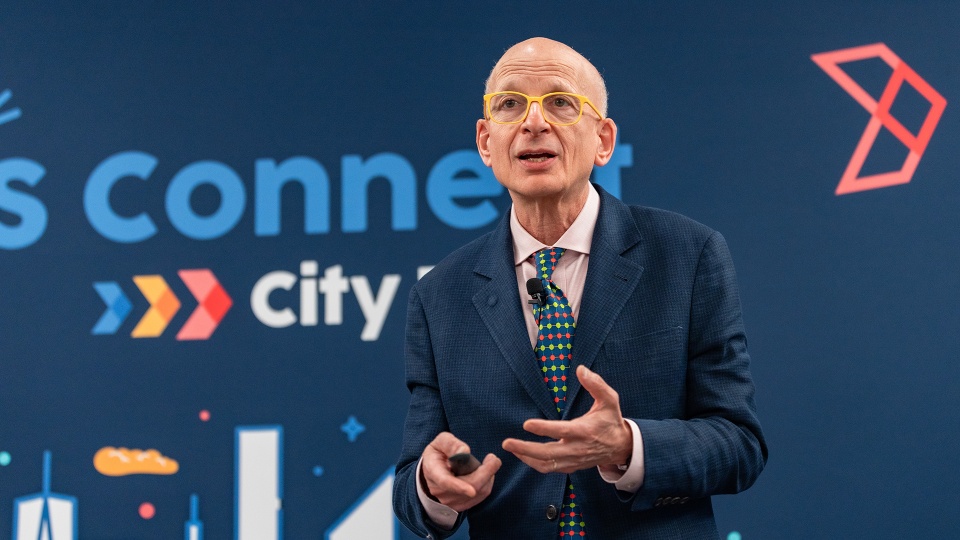

Seth Godin: Making it to the Finish Line
Seth Godin
Best-Selling Author, Entrepreneur , & Agent of Change
In his talk, the bestselling author and entrepreneur explains to the audience that the hardest part of an idea, a startup, a new strategy or a business proposal is the getting started part of the equation. Godin stresses in his creative innovation keynote that coming up with simple ideas is not the hard part, but really embracing them and making sure that they are finished is. The entrepreneur knows how hard it is to share projects or ideas with the world; however, he thinks getting over these doubts—which come out for our 'lizard brain'—is the most important part because that “thrash at the beginning” is normal, we just need to keep going.
Alright. The grand finale. I hope you all have had an enjoyable day.
I think we've had some phenomenal speakers.
I'll wrap things up after our next speaker, but I I'm just gonna ask, who here knows who Seth Godin is?
Okay. My work here is done. No.
I was I was catching up with Seth beforehand. I said, Seth, how does one introduce Seth Godin? He said, they either know me or they don't. Doesn't matter.
Seth is an author, as you can see.
He's an entrepreneur.
He's one of my favorite thinkers, personally.
I think he's my favorite...
Alright. The grand finale. I hope you all have had an enjoyable day.
I think we've had some phenomenal speakers.
I'll wrap things up after our next speaker, but I I'm just gonna ask, who here knows who Seth Godin is?
Okay. My work here is done. No.
I was I was catching up with Seth beforehand. I said, Seth, how does one introduce Seth Godin? He said, they either know me or they don't. Doesn't matter.
Seth is an author, as you can see.
He's an entrepreneur.
He's one of my favorite thinkers, personally.
I think he's my favorite podcast guest.
A lot of people doing podcast, and, Eli, I love yours.
But as a guest, I find that the density of the value you get to the words that he says is super high.
I mean, it's podcasts, his books, etcetera.
But what comes through is I think what he says in his blog about himself. I was looking at the bio section of his blog.
First thing he says is I'm a teacher.
I think that's what he does. He teaches through books, through speaking like this, and we at User Testing are incredibly fortunate and honored to have him here today to talk to us.
I've had team members come up to me in the preceding weeks knowing that we were gonna have Seth on, knowing that I was gonna introduce him, just tell me stories about books that he's written, things that he's done that have impacted, you know, them. One of my colleagues said, hey. The Seth's book, The Purple Cow, first one on the top left there, changed the trajectory of my career way back when. He kinda dated himself with that comment, but, countless stories of that in our team at user testing and I'm sure in the audience across, across all of us.
Quick quick, question. April eighth, about five weeks ago. I think that's five weeks. No. Seven weeks.
Try to think what you were doing. Remember, what what were you doing April eighth twenty twenty five?
It was a work day.
Well, Seth was publishing his ten thousandth blog post.
Ten thousand. That's one or two posts a day for twenty five years uninterrupted.
Talk about dedication and, and teaching. He's been teaching us for a long time. I I don't know if anything I've done for twenty five years or ten thousand times in a row that doesn't involve just survival like eating or bodily functions. We don't need to go there.
Lastly, in twenty eighteen, Seth wrote This is Marketing, the third book on the top left, and the marketers loved it.
But, of course, it was written for everyone, so everyone loved it.
But us lonely chief strategy officers out there in the world, we're just waiting for our time.
In October twenty twenty four, we got it.
Seth's latest book, This is Strategy, finally.
Something for us, the chief strategy officer people who nobody knows what we actually do.
We got our book.
I've read I was telling Seth, I've read a lot of strategy books in my day. There's a ton of them. They're usually written by Harvard professors or McKinsey consultants, and they're pretty dull. They're usually really, really dull.
And Seth, as he does in his characteristic style, took a different twist to a strategy book, made it really interesting, really consumable, and I think it's for everybody. It's not just for strategy nerds or consultants and folks like me. So, the good news is I think the shipment made it. I hope team tell me yes, no, but we have his book, his latest book, This is Strategy, and, we'll have it, available in the happy hour. But let me get to the good part in introducing Seth Godin. Please welcome him to the stage.
Thank you.
Hey. Thanks for sticking it out to the end of the day.
It's the end of May, so unfortunately, we gotta talk about golf.
Can we agree that golf is the worst spectator sport? Nothing good ever happens, and if something good does happen, you're not allowed to wildly applaud. So let's just model this. Give me the worst, most anemic golf applause you can muster. That was terrible. Thank you. Can you double it?
Double it again one more time. Beautiful. Thank you. So I'm gonna argue today that that's what you do for a living.
You find small little threads of interest. You connect them. You mirror them back. You amplify them, and it continues.
And there are very few people in the organization who have more ability and leverage to do that than the people in this room. And there are a bunch of reasons it's important, and I wanna thread them together. So this is footage from a bike race in Italy. This guy's in last place, and he decides to use a new approach, a new strategy, a new technology to completely change and transform the the whole idea of bike racing. And the other people who see him do this do not think it is fair. It doesn't matter whether it's fair. It has transformed this particular race.
And we all live in a system. And whatever system you're in feels normal, that we do the things we do. We wear the clothes we wear. I mean, if you had shown up at a meeting in this building forty years ago dressed as we all are dressed today, it wouldn't fit right. And fifty years from now, we'll be wearing Star Trek uniforms. Things change.
And it's very tempting to imagine that the normal we have is the normal that's gonna stick around, but it's not the case. So when I was a kid, these were the brands that were worth billions and billions of dollars. And all of them were built by building average stuff for average people and promoting it to the masses.
Today, it's pretty easy, and all of these aren't tech brands, to imagine that it's possible, in fact, required that you're gonna build a multibillion dollar brand without relying on mass marketing and mass advertising. That when this show was on television, The Monkees, every episode was seen by fifteen times as many people as saw the last episode of Secession, the biggest hyped movie of the TV show of the year. That's just in one person's lifetime, a decrease by a factor of fifteen.
So what we think of as getting the word out has completely been transformed, and it's easy to not see it. So this meme went around on the Internet a bunch of years ago. If you take a bat that's sleeping and you turn him right side up, he looks like a badass. Here are here are three bats at a cocktail party, and you can see they're just hanging up. And this hit home for me a bunch of years ago because I was giving a talk in the capital of Canada, and I get up early in the morning and I'm going for a walk and I pass this beautiful piece of art. And I go, oh, that must be a first person's term, Awato. And then I realized I'm on the wrong side of the sign.
And on my desk up in Hastings, I have this box, and the contents of this box cost me, I'm not exaggerating, twenty four billion dollars.
Because back a long time ago, I had access to the Internet and almost nobody else did with dial up and the whole thing. And I saw what was going on online, and I decided to make a book about it called The Best in the Net. That book, which took four months to to create, sold one thousand nine hundred and forty five copies. And at the same time I was doing that, two guys in California named David and Jerry also saw the net. And they didn't make a book about it. They built Yahoo.
And my half would have been worth twenty, thirty, forty billion dollars, but I didn't see it.
So what I want to encourage you to come back to is this first principle that what we get to do is work that matters for people who care. And we have to decide who are the people who care and what is the work that matters. What is it exactly that you make? What is it that your company makes?
So my argument is this. The first thing we make is stories. It's stories that people pay for. It's stories that people consume, not the actual widget.
That if we're good, our stories make a difference.
But in order to do that, where people are relying on you is we make decisions. And the harder the decision is, the more they need your insight, the more they need to understand what users and customers and people you seek to serve want. And when we add it all up, what we're here to do is make a change happen. If you're not here to make a change happen, why are you taking up room in the building? If you're not here to make a change happen, what are we even talking about? That nobody in this room does a job that is required to do what happened yesterday again.
That all of this is about living on a frontier.
So this picture is really fuzzy. I had a bad cold when I took it. But I took it because it's emblematic of the challenge and opportunity that we have here. The blue box in the upper middle center, the brand manager for that product spent a hundred million dollars interrupting all of us because their pain reliever is just a little bit better, they think, than the other people's pain reliever.
But if you got a bad cold and you go to the store, you're not looking at that. You just said, give me the close one, give me the cheap one. Because ultimately, they all feel the same. The stories are different now.
We have other things to worry about. But we work at a company that is obsessed with thinking like a factory, that you're supposed to do what you're told over and over again, that management is about pushing people to continually follow the manual to go faster and faster and faster because the incorrect measure of productivity is how do we organize this place to do what we did yesterday, but faster and cheaper?
And it's not working anymore.
It's not working anymore because faster and cheaper means get rid of all the humans and have Claude do it. Faster and cheaper means a race to the bottom. Faster and cheaper doesn't use any of the skills and value you're able to create.
So my friend Donegal, wrote this great book, and she argues that people want three things, control, comprehension, and community. Control because they don't wanna feel at sea, like they're a victim of circumstance.
Comprehension because they want to understand where they fit in. And community because they want to be part of something.
Around the same time she was developing those theories, mine don't all start with the same letter. What I'm arguing is that what people want is status, affiliation, and the freedom from fear. This is what your colleagues want at work. This is what your customers want. That all of the things we do, once we have enough to eat and a roof over our head, is an adjudication of status roles and a desire for community and affiliation.
So to give you an example, this is a recumbent bicycle. The recumbent bike is the fastest, safest, best bike you can buy, and almost no one has one.
How come this bike, which is demonstrably faster, which won the race across America, which is safer and better for your body, isn't popular?
The reason is that Charles Moshe, the person who invented it, did it in Paris a hundred and twenty five years a hundred and five years ago, when Paris was, like today, a hotbed of bike racing. And he took this bike, and he went to the best bike racers in Paris and offered to pay them to try to break the world record for the longest distance, pedaled in an hour, and they all turned him down. So he went to the ne'er do well brother of one of these racers, and this guy got on the bike and broke a world record, broke it in a way that stood for a long time. So what did the high status racers do?
They felt threatened. Because if some yokel could break the record on this new kind of bike, they might be in trouble. So they went to the bike manufacturers. The bike manufacturers also saw this as a risk to their status.
So the bike racers and the bike manufacturers got together and banned recumbent bikes from international competition, a ban that stands to this day.
Right? But that's only a couple thousand people.
So why do other people not ride bikes like that? Because they wanna look like they could be in a bike race. They wanna look like they are sharing the status of the people who have these kinds of track graphite whatever bikes.
It's everywhere we look. That what we need to ask whenever we make a product, whenever we make a service is two questions. Who's it for and what's it for? And the answer to what's it for is almost certainly to either raise the status of the people we are serving or to help them fit in, to join in. People like us do things like this. So what we have to do to accomplish that is treat different people differently. Because different people want different things.
The mass marketers have left the building.
Heinz ketchup, Velveeta cheese, these used to be massive success stories because people wanted what everybody else had. But that's not true anymore. What's true now is there isn't a mass market, not for TV and not for red condiments to put on your chips. There There is whatever it is that you and the people like you want. People like us do things like this. And the deep knowledge that we get from user testing, from customer experience, from finding the empathy to engage with people who are different than us is missing from so many organizations that have been brainwashed to do what they think used to work.
So what are the elements then of getting the word out of hundreds of helping people find what they're looking for? Well, the first one, the giant breakthrough, the thing that defines our world more than most people realize is the network effect. The network effect is super simple.
Will this work better if I tell my friends?
Will life get better for me at work if I share this book?
Will this club work better if other people join it?
It's a long way of saying Facebook.
Right? Facebook doesn't work if no one you know is on it.
If no one yeah. If the people you know aren't on it, it doesn't work. The second thing is the adoption curve. The adoption curve is now way more important than ever because the world is changing faster than ever.
So you've all seen Rogers' curve here. What it shows is this, that about fifteen to twenty percent of any population is in it for the new stuff, and fifteen or twenty percent like to go last, and the masses are in the middle. This is a choice. So fifteen people fifteen percent of people are watching all of their videos on an iPhone.
Fifteen percent still have a twelve flashing on their VCR, and everybody else is in the middle.
This curve is real. This curve is essential, because no matter how fast your product is gonna grow, it's going to grow along this curve. So a whole bunch of people signed up, I don't know how many, tens of thousands signed up for that new, AI thing last year. And everyone said, wow. It's gonna be a huge success. And then they shipped it, and it died.
The before there was the iPad, there was the Apple Newton. What people don't remember about the Apple Newton is that they sold a hundred thousand of them in the first month.
It was as big as the iPhone when it launched, and then it went away. Why is that? So here are pickup trucks. If we look at the Scout, they got, five hundred dollar deposits for more than a hundred thousand people in the first week it was on sale. Then you've got that other thing. Then you got the blue Ford f one fifty, which is right in the middle, and then you got the people who are driving a fifty year old pickup truck. The thing is, this is incorrect.
It is incorrect because between the new people and the masses, there's a hole. There's a chasm. Jeff Moore teaches us this. And what happens is something that's novel that doesn't work falls into the chasm and disappears.
And this is why your research is so important, because you need to give the institution the confidence to build scaffolding, to stick with it and stick with it and stick with it so it gets across the chasm.
When you launch something really shiny and new, of course, the new people who like the new are gonna grab it. Then what happens?
So some of you may have seen this video. My friend Derek Sivers and I both blogged it the same day, and we didn't even know each other. But it's, taken it at a music festival. I've edited it to make it faster.
This guy's a little on drugs. He's dancing and dancing and dancing. This goes on for several minutes, and he's nothing's happening. But then then guy number three shows up.
Guy number three is critical because if they had given up before guy number three showed up, people four, five, six, seven, eight, nine, ten, and four hundred would never have arrived.
What we need to do is build into the product from the beginning the network effect, build into the product from the beginning the story and the status seeking, but then build the scaffold to make it more likely that we'll cross the chasm. So these guys didn't do that. That's why there's no gluten free shampoo. These guys didn't do that.
That's why there's no gluten free parking. But what we can do if we choose to race to the top is invest in being patient as we seek to cross the chasm. So here's, computers for sale on a Russian website. Drop down sorting, cheapest first.
That's not your friend. Cheapest first goes in lots and lots of places. Here's coffins on Costco. Cheapest first.
You're the problem with the race to the bottom is you might win or worse, come in second.
Figuring out how to do that, AB testing your way all the way to the point where you become a porn site, that doesn't help you.
What you have to do is stand for something by building a story in. So if you go not ten blocks from here, you can go to Tiffany's and buy a diamond engagement ring for six thousand dollars. If you take that ring and fly economy class to Belgium, to the diamond district, you can sell it for a thousand dollars. Where did the five thousand dollars go?
The five thousand dollars are in the blue box.
The blue box is the story. What's it a story about? It's a story about status.
It's a story that says, I love you so much, I overpaid by a factor of six so that you could have the blue box.
That is what Tiffany sells. They sell status.
Ted Levitt famously said, no one needs a drill bit. What they need is a hole, but that's not completely correct.
They don't need a hole. What they need is a way to mount the bookshelf. No. They don't even need a way to mount the bookshelf.
They need a way to get the feeling they get when their spouse says, thanks for doing that. That's what you sell when you sell drill bits. You sell that feeling. Are you gonna be able to sell it to everyone?
No. We sell it to the smallest viable market, the smallest group of people that we wanna be on the hook from, that we want to delight. Because if you can't delight the smallest viable market, you can't delight anybody.
And then they're the ones who will tell the others.
You're not gonna alert everybody by buying more YouTube ads. It's going to happen because the people who need for the idea to spread will spread the idea. The simple version of this is if your slogan is you can choose anyone and wear anyone, you're doomed. If you need to use SEO to get found, if you need to just be, you know, triple a locksmiths, so you're first in the yellow pages, you're racing to the bottom.
Stamps used to work because there was friction. It wasn't unusual for a direct marketing campaign to get a three percent response rate. The problem with email is anyone can do it, so anyone does. And this is not a good flavor of Oreos.
That sorry. My throat's not so good. No.
What you need to be able to push back on the team to say is if you're demanding, as my boss, average stuff for average people, you're making a mistake. Before we went even further, your strategy's wrong. Your strategy of let's make average stuff for average people, sand off the edges and make it a mass market success, everything we do after that isn't gonna work. We went too far.
What we have to do instead is deliver anticipated, personal, and relevant messages to the people who want to get them. Who would miss you if you weren't there? We're not here to get the word out. We're here to help the smallest viable audience decide to get the word out because they want to, not because we want them to.
Okay. So shifting gears a little bit. Years ago, I went to visit my friend Lionel.
He's passed away since then, but he ran the, most famous bakery in the world. And to get there, my wife and I took the kids. We missed a flight, and we missed a connection.
But, eventually, we land, and then it's a long, long drive.
And, my wife has transportation narcolepsy, which causes her to fall asleep on any moving vehicle unless there's a good movie on the plane. And so she was asleep the whole time. My kids were making a ruckus the whole time. And we're driving through this pasture in France. Could you turn off the light on your phone if you don't mind? Thank you. And I noticed from the back seat, it's finally quiet.
And I look in the rear view mirror, figuring my kids are finally asleep. They're not asleep.
They're staring out the window at this perfect specimen of a cow for, like, four seconds. And then they went back to making a ruckus. You know why? Because cows are boring.
You've seen one cow, five cow, ten cows, they're all the same. But if it had been a purple cow if it had been a purple cow, I would have pulled over, and I would have taken pictures of it. And my wife would have gotten on the phone and called her friends and told them that she was looking to purple cow. My kids my kids would have ignored me as usual, opened the door, run across the street, jumped over the fence, and rubbed the cow cow so that when they went to show and tell, they could tell their friends they'd seen and touched a purple cow.
All it means to be purple is remarkable.
And what remarkable means is worth making a remark about. Not a gimmick, a service. A service you are doing for your smallest viable audience that they want to talk about. Social media is not how you succeed. Social media is a symptom that you have succeeded.
You succeed when other people talk about you online, not when you talk about yourself.
So let's think about the fax machine. The first person with the fax, what exactly did they do with it? You can't send a fax to yourself because you'll get a busy signal. Instead, you ought to tell your accountant and your bookkeeper and your lawyer to go get a fax machine so you could send them a fax.
And so it spread. This is called Metcalfe's law. Metcalfe's law says that the value of a network goes up with the square of the power of the people on it. It's not the fight club where you're not allowed to talk about it.
It's a club where you're supposed to talk about it. We're not here to talk about the funnel. The funnel is overrated. We need to turn it into a megaphone and give people a chance to talk about what we made.
Why will they do that? Because we delighted them.
Because we created and relieved tension. Because we gave them status. Because we created a way for affiliation to occur.
Okay. So three words I wanna share.
The first one is a Zulu term, saubana.
It means I see you.
It doesn't mean I see your face. It means I see your parents and your grandparents and your great great grandparents. I see your wishes and your dreams and your desires.
It is to truly understand somebody.
Is there anything your customers want more than that? Your coworkers want more than that to be seen?
The second one is enrollment, which is people voluntarily deciding to go with you, not you hustling them or hyping them. No one wants to be hustled at all. What they want is to be invited along. And the third one is tension.
The tension of this might not work. The tension of it's about to sell out. The tension of this is the new model. Is it any good? The tension of am I being left behind? The tension of will this make me go up or down in status.
So let's bring that all together. I'm gonna time you. Let's do a little test. Ready? Go.
Okay. Stop.
Eleven seconds. I was sweating bullets there for a second.
Eleven seconds, not bad. Every group I've ever done that with around the world has pulled that off.
How did you know which rhythm to clap? There were some fast clappers who tried to get you on board and then some slow clap. How did you know?
People like us do things like this. We are organized emotionally and genetically to be in sync.
That if you look around the room, no one's in a prom dress, no one's in a tuxedo. There was no memo. You thought about it, and you all did great. Congratulations.
People like us do things like this. And so what we have is a chance to narrate, construct, connect for the tribe. There's a group of people who want us to connect them, to build a culture, to commit to where they're going, to challenge them to get to the next level with more tension, to be clear about it, and to communicate over and over and over again. That is what this event even exists for.
Right? They could have sent everybody a memo, but they didn't because being in a room with the other people like you, that is where the value is. The Beatles did not invent teenagers, but they did show up to lead them. Bob Marley did not invent the Rastafarians, but he did show up to lead them.
You do not have a tribe, but you get a chance to narrate for one, to connect for one, to see them and help them get to where they are going. This works in b two b. It works in politics. It works in nonprofits.
It works for people who are trying to make a living. And so when we think about this idea of fitting in, you can go online and see how many to type in Harley Davidson tattoo. There's a ton of them. Look at these people at these various walkathons.
Right? That going to a walkathon is about being where the other people are. So this picture I took, about eighteen blocks from here. Here's a bunch of friends out for a bike ride, and what you will notice is that the woman on the left has a helmet, and she's not wearing it.
Why isn't she wearing it? Because the other people on the bike ride aren't wearing helmets.
And this isn't just silly stuff like helmets.
If you do a little bit of research, you will see that until recently, the SPCAs and humane societies in the United States killed four million dogs and cats every year, usually within twenty four hours of taking them off the street. Not because they're evil, but because it was their job in writing. That's what they had to do. My friend Nathan Winograd saw this. He was, in San Francisco at the time. And he said, I didn't get into this line of work to start killing dogs.
And with no money and no budget, he went to the people of San Francisco, but not all of them, just enough. The smallest viable audience, a hundred people.
And he created the idea of the no kill animal shelter.
He left San Francisco after making such a difference that not one healthy dog or cat has been killed by this humane society since he was there.
And he went to Ithaca, New York, and he did it again. And then he went to Raleigh, Durham, North Carolina, and he did it again. And then he went to Houston, and he did it again. And now it's in five hundred cities around the world.
People like us do things like this. Okay. Continuing my rant. Do me a favor now, if you don't mind, and raise your right hand just as high as you can.
Thank you. Now raise it higher.
What's that about?
We we hold back because we've been indoctrinated to hold back by school. Because if you give everything you got, your parent or your teacher or your coach is just gonna ask for more. And when you have a boss, you understand this. You give everything you got, you got that's not gonna work.
You gotta leave a little bit extra. And this concept of how do I hold stuff in reserve while I'm waiting for a map, while I'm waiting for instructions, while I'm waiting for someone to tell me how to get an a. The fact is, I can't give you a map about this future, not even a fictional map. Because what we signed up to do is make change to not just predict the future, but to build the future.
But we live in a world where this is a real book, where people needed to buy a book to learn how to raise invisible sheep without making any mistakes.
So I'm not in favor of competence anymore. I don't think competence is gonna get you anywhere. I think if you have to struggle to be pretty good at all the checklist items, you have a real challenge. Because if I can write it down, I can find someone cheaper than you to do it, and that it's only gonna cost me twenty dollars a month now that I've got AI on my machine.
AI isn't a threat for people who are inventing the future. It is a threat for somebody who is filling in the boxes.
Now it's not fair that after all these years of you exceeding expectations at the old rules, they have made new rules, but we have.
And so we have to go back to work and say, no. I don't do checkbox work anymore. I'm gonna hire an AI to do that. I insist on being in a different kind of group. The people who did the, the free hugs video that was a big sensation a while ago, they made this guy really uncomfortable because he worked hard to be in the expensive hugs business, and they don't care. The same way bottled water used to be a highly profitable business, but now if it's all the same, just buy the close one or the cheap one. I mean, this one worked, but not usually.
So when we think about where we're gonna go from here is this.
Surfing is different than golf.
Golf is asymptotic perfection seeking behavior. We can play the same hole over and over again to get just a little bit better. Surfers hate that.
Surfing is about picking the right wave and knowing that every wave is going to be different. One of the things you'll notice about good surfers is they pick good waves.
It goes in that order, that what we have to figure out how to do is embrace the idea that we are exploring on a frontier. If failure is not an option, then neither is success. The person who invented the ship also invented the shipwreck.
And if you're really uncomfortable with shipwrecks, you're gonna have a problem going forward. That our motto needs to be, here, I made this, and it might not work.
Because we can't say, I have predicted the future and I'm guaranteeing it's gonna work. In Italian, this is salto mortale, the dangerous leap, the leap into the void, that feeling we get when we are going out on a limb to make a point.
And what you've been taught is to wait.
It's always too soon to start. When Gutenberg launched the printing press, ninety percent of the people in the addressable market did not know how to read, and forty percent needed reading glasses, which had not been invented yet, and there were no bookstores. He should have waited.
When the car was developed, there were no driver's licenses. There were no roads. There were no all night drive through liquor stores. He should have waited.
None of those things get us to where we need to go.
That if you go do a, YouTube search for riding a bicycle, this is what you're gonna see, people crashing. Because people crashing makes good video. It makes the people at YouTube happy, but that's not what we need to focus on.
So I'm gonna leave time for questions. I have no idea how much longer we have this room for. But before I do, I have a couple more things I wanna show you.
I didn't show you that whole bike video from Italy. This is the end of the video. The guy figured it out. He made it all the way to first place. He has the thing wired, and he sticks with it, and he sticks with it. Everything is fine. But inevitably, when you do that, someone's gonna copy your idea, and it's not gonna get you where you wanna go anymore.
This creative destruction is gonna keep happening.
We're never gonna go back to normal. The world right now is as normal as it is ever going to be again. Today is peak normal.
And so when we are surrounded by people who keep shifting and changing, we have to decide what we're gonna do with that.
In nineteen twenty seven, there was a conference. It happens every three years. It's called the Solvay Conference. The nineteen twenty seven one was the best one, the most famous one. There are twenty nine people in this picture.
Several of them won the Nobel Prize. Albert Einstein's there. Marie Curie's there. Niels Bohr is there. Some people say Heisenberg was there. It's uncertain. But the thing is, of the twenty nine people, seventeen won the Nobel Prize in Physics.
And almost all of them won it after this photo was taken.
You didn't get invited to Solvay because you won the Nobel Prize. You won the Nobel Prize because you were in the room.
So here you are in this room.
We are completely redefining what it is this profession does for a living.
Some of the people in this room are gonna change things dramatically.
One year from now, you will hear about how different meetings, different postures, different arguments are going to transform companies in this new era.
And some of you are gonna think it's just too soon and you should just wait.
And you're entitled to whatever strategy you want, but the opportunity is right here in front of us. So last story I wanna tell you is this. About twelve years ago, I got invited to this really cool conference in New Mexico. I got to bring my family with me and, met some dear friends like Sarah Jones. But the last night, it's really cold, and they bring us out on this mesa.
It's like three degrees Celsius. We're all wearing blankets. The sky is super clear, And Neil Armstrong is there. Neil's gonna give what I think is his last public appearance.
And he's standing at the fire. I think there was some advanced planning.
And while he's talking, telling us about his mission, the biggest full moon I have ever seen starts to rise. And Neil stops, and he turns and he says, I've been there.
The thing is, there are footprints on the moon.
NASA sent people to space and brought them back safely when the sum computing power of the entire institution was less than the phone in your pocket.
What I am challenging you about here, and it is a challenge. I acknowledge that it's a challenge. What I am challenging you here is simple, to do something that might not work and to lead at the cutting edge.
And when it gets frustrating, and it will, just go outside and realize there are footprints on the moon. What your organization is telling you as clearly as it can is some people here need to change things. The question is not will you succeed. You have all succeeded. There is no doubt about it. That's why you're here.
The question is, will you choose to matter?
Thank you for your work and your attention.
Can we do some questions? Is that okay? Yeah. I got the signal that we can do questions. So if you got a question, raise your hand, and we'll you will yell and do all those other things.
Stacy, you got a question?
Nothing.
Nothing. I'm dying up here.
I have so much to say.
So we need you to leave. The question is that a lot of times people aren't empowered to leave.
So I wanna tell you her question is a lot of times people aren't empowered to leave. And you're not a shill. That is exactly the question I wanted you to ask.
There's a difference between responsibility and authority.
Your organization is not gonna give you any more authority. Sorry. But organizations hand out responsibility like m and m's. You can have all the responsibility you want.
And the kind of responsibility we can take is not, please give me unlimited resources and time, and this is gonna work. There are much smaller cultural shifts.
No one in this room would get fired for starting a book club every Friday over lunch and inviting key people to come and talk for half an hour inside your organization. Everyone could take responsibility for doing that. That when we look at how people in the organization talk to each other, how meetings are run, how we keep score, what does it mean if you start an internal newsletter chronicling this and emailing it to people who wanna get it? Right?
What does it mean if you come up with a rubric of the six questions we ask before anything changes on the website? Right? These are things that you will never have authority to do and that you can all take responsibility to do. That nobody said, Jackson Pollock, here's your artist license.
Go make a painting. We'll put it in MoMA. That's not how it works. Jackson Pollock makes a painting.
People hate it. So he makes another painting, and people hate it. And eventually, it shows up in MoMA. His brother, you didn't know he had a brother.
Charles Pollock was also a painter.
Charles Pollock painted just like his teacher, Thomas Hart Benton.
But we already had Thomas Hart Benton, and so we didn't need Charles Pollock. And so this is the opportunity. We get to work indoors. We get free snacks.
Sometimes there's even coffee. What will we do with it? Thank you for letting me rant. Okay.
Other questions?
Yes. Over here. Thank you.
What are some, like what are some tropes, like, that you hear, like, phrases that just kinda drive you crazy that, like, you just wanna challenge and, like like, the customer is always right.
Or if if they knew what they wanted, they could have had faster horses or, like, what are those things that just drive you insane?
Alright. So we already covered my boss won't let me. But the the problem with most data that is presented by people in this space or any space is they think the data speaks for itself. The data never speaks for itself.
Graphs that purport to tell you an honest analysis of data never do. You must have a point of view, and then you defend it with data. If someone wants to undo your point of view, they can challenge your data. But when we say here's the data, the client is always gonna pick the laziest, easiest to defend version of the story if you don't tell them the story to begin with.
And this is why AB testing gets groups into so much trouble. So I was at Yahoo when we had a chance to buy Google for fifteen million dollars. Not billion, million.
And there were five VPs.
I was not in the room when they decided to say no, but they did.
And based on the data they were looking at and the strategy they thought they had, they made the correct decision.
They AB tested their way into a hundred and eighty three links on their homepage.
That all of the stuff that evolved at Yahoo, and it was the center of the entire Internet, was because people who had their hands on data didn't tell a good story to the people who were making decisions.
That for me is walking away from a responsibility that could be huge. Right? Own a point of view.
Thank you for that. Yes, please. Sharon.
I'm gonna coach you. So there is one there's something you said in the past about, how dare you settle for less when you when the world has made it so easy for you to be remarkable.
So I'm curious to understand how do you, use AI at this time, or do you even use it at all?
So I use AI every day for an hour to a day because if I don't, I'm gonna be afraid of it and fall behind. I made the decision personally, non profitably, that every word I write, I write. I have no team, I have no staff, and AI is not writing it for me. But for example, in the new book, what I did a lot was I would come up with a list of three or four things.
You saw I like lists. And I'd say, hey, Claude. Here are three or four things. Come up with four more.
And I was blown away on a regular basis that it was discovering things that belonged on, not all four, but things that belonged on lists that it hadn't occurred to me. It's regularly prompting me for stuff like that. I also find it's really useful if you have a dense, document, particularly if it was edited by multiple people.
I upload the whole thing and I say, where are the contradictions? Where are the weak points? What are the hard questions that need to be asked? Because most of your colleagues are afraid to give you that sort of feedback. So we'll do that. Also, we talk about my dog.
What else?
Yes, please. You know, you look like someone I know.
In the, in yeah. Actually, I played with it. This is about trust. Right?
You're the security guy. Yeah. If someone's gonna get a bullet, it's not gonna be me.
How does trust factor into where you Love this.
How does trust factor into all this? The words matter.
Brand is totally misused.
Brand is not logo.
Brand is expectation.
So we know Nike has a brand and Hyatt has a logo. If Nike said we're opening a hotel, everyone here knows what it would be like. If Hyatt said we're coming out with a line of shoes, all we know is it would be comfortable. That's all we know. Right?
And so to build a brand, you make a promise, people have an expectation, and then you either meet that, exceed it, or fail. And when you fail, you burn trust. When you interrupt people, you burn trust. When you trick people, when you act like a monopolist, there are all these things we do to burn trust.
The other word that goes right next to that is loyalty. The airlines say they have loyalty programs. No. They have bribery programs.
Because if it was a loyalty program, you would happily pay extra to stick with your brand. No. You're only paying because you get a prize in return. So when we put all these pieces together, what we see is that the return on trust in a crazy world is higher than ever.
And most organizations are too impatient to invest in that. But if you're going to invest in it, you have to be clear about how you do that.
So you can't say money back guarantee and then not pick up the phone when someone calls you, and then argue with them about the money back guarantee, etcetera, etcetera. If someone's going to go to the trouble of calling you, that moment is priceless. Because if you over deliver in that moment, they're gonna tell twenty people. That's so much cheaper than building a better website or running a TV ad. That what we seek to do with trust is not guarantee we're gonna be perfect, but decide that when we are seen as not perfect, that we're gonna listen and fix it. Because like that Japanese pottery style that his name I can never pronounce right, kitsugi, it gets better when you repair it.
And we've got all these organizations that seem to think that move fast and break things is a good motto. It's not. It's move fast on behalf of the people you serve, and if something breaks, fix it. That is a useful motto.
Thanks. Time for two more. Yes, please, in the back.
I'm sorry.
Leave the The amount of resources needed to maintain that network and grow it also.
Right?
So what is your, like, recommendation out of managing that Right.
So it's a question about the network effect. And what you're saying, correct me if I missed something, is as the network gets bigger, it gets more powerful. But you're also saying as it gets bigger, we have to spend money to maintain it.
The brilliant insight of the last forty years is one of those things goes up arithmetically slowly. The costs go up slowly, but the benefits go up fast. And it's that difference that makes all the difference in the world. So cavemen didn't have the network effect because putting more people in the cave doesn't work.
But you can put more people on a server way more efficiently than you put people in a cave. So what we're seeking to do is find useful versions of the network effect, and it even works for things that are scarce. So if you've seen those Van Cleef and Arpels, necklaces that some people wear, They you have you have to get an appointment to go to the store. You can't even buy it on it's very hard to get.
But that means the status of someone who has one goes up, which makes them brag about it even more, which creates a network effect. Even though they're not necessarily making more jewelry, they're getting more emphasis for more buzz. Alright. Let's wrap up with one more. Yes, please.
From your experience moving forward, is there any specific skills or values would be beneficial for us to be winners in this game?
That's a great question. How do I say your name, Nadia? Natalia.
So the question was, what skills are useful going forward? Right? And I think they are two. Just two.
Solve interesting problems.
That is different than solving a problem where the answer can be looked up. An interesting problem is one we don't know the answer to yet.
Most people at work do not seek out interesting problems because it feels scary. They seek out problems where they know they're gonna get an a.
And number two is lead. And the way you lead is not with authority because it's voluntary.
You invite people to go with you. You organize three people or five people. You run a small inquiry session. I don't know any answers, but I have some questions.
Who wants to come ask questions? Right? And if you combine these two things over and over and over again, solving interesting problems when you can and connecting and leading when you aren't solving interesting problems, I don't think you're ever gonna be out of work. I don't think you're ever gonna have to worry about getting your resume on LinkedIn because this is so scarce, someone who can do these two things.
It doesn't mean you're confident. You don't have to know you're right. It means you care enough to be generous to say, this is gonna get better if I show up and do these two things. Who wants to come?
And so we have plenty of managers. We don't have enough leaders. We're not running out of problems, and there are people who are desperate for the connection that will come with that.
Anyway, we're gonna do a book signing, I think, over there. Is that the the answer? Yeah. I'm gonna let you all go. Thank you so much. Appreciate it. Keep making the record.
You want the mic? Okay. Thank you, sir.
Thank you. Thanks so much.
Thank you so much to Seth. I think, my mind is spinning. I assume a lot of us, are spinning, thinking about some of those ideas. As Seth said, we have a happy hour.
We have copies of his books. He's kindly agreed to stay. I just wanna say thank you to all of you for coming. Thank you for spending the time with us.
Thank you to our speakers for the thought provoking discussions around customer centricity, innovation, design, AI, all these topics we're all thinking about. This is a really special group, really special community we have here with user testing, so we appreciate the time you brought to us, and I know I'm between happy hour and you. So let's go have fun and talk there. Thank you.
